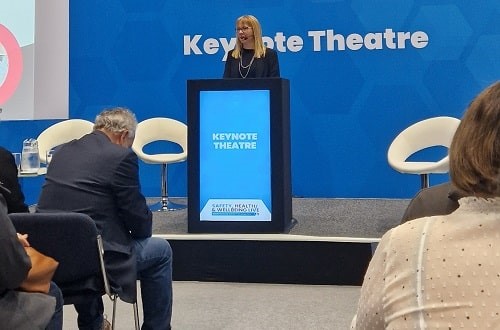The use of civil sanctions as an alternative to criminal prosecution for certain workplace health and safety breaches should be considered, Rhian Greaves, a partner at law firm DAC Beachcroft, argued during a presentation at the SHW Live North conference in Manchester on 23 January.
News
Lawyer makes case for civil sanctions to address health and safety breaches
Making use of a “toolbox” of civil sanctions, including fixed monetary penalties, compliance notices and enforcement notices, would be “quicker” and “more cost-effective than prosecution” and would take pressure off the criminal court system, which has been “on its knees for some time”, according to Greaves.
The UK Environment Agency already uses civil sanctions to address some environmental breaches. A recent example of this saw Yorkshire Water agreeing to pay a record £1 million to two environmental charities after an EA investigation found it had breached its environmental permit with an unauthorised sewage discharge.
 Rhian Greaves, DAC Beachcroft: "My own view is that this is a conversation we at least need to start having." Photograph: British Safety Council.
Rhian Greaves, DAC Beachcroft: "My own view is that this is a conversation we at least need to start having." Photograph: British Safety Council.
Yorkshire Water submitted an enforcement undertaking – a voluntary offer made by companies or individuals to make amends for offences – through which it agreed to pay £500,000 to both Yorkshire Wildlife Trust and Yorkshire Dales Rivers Trust.
While the EA embraced the idea of using civil sanctions as an alternative to criminal prosecutions in some cases, the Health and Safety Executive (HSE) “didn’t want to go down that route”, said Greaves. However, given that 10% of health and safety-related criminal cases have “waited more than two years” to come to court, Greaves believes it is time to reassess that position.
“My own view is that this is a conversation we at least need to start having,” she told delegates attending the conference.
NEWS

Nearly half of UK workers afraid to flag risks, finds new research
By Belinda Liversedge on 10 February 2026
A significant “silence gap” is threatening UK workplace safety and operational integrity, according to new data released by training provider Mental Health First Aid (MHFA) England.
Sexual misconduct in dentistry: former GDC fellow warns of ‘culture of silence’
By Belinda Liversedge on 05 February 2026
A former General Dental Council (GDC) clinical fellow is calling for a radical shift in how the dental sector manages workplace risk, warning that a “culture of silence” is masking the problem of sexual misconduct in the profession.

Tinnitus UK demands national safety standard as live music workers face hearing loss epidemic
By Belinda Liversedge on 03 February 2026
Tinnitus UK is calling for clear, enforceable standards on hearing protection and training after a staggering 93 per cent of live music workers report hearing problems.



